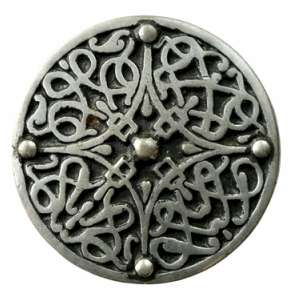- Home ›
- Irish symbols ›
- Celtic holidays
Celtic holidays: Lá Lúnasa, 1st of August
 A brooch bearing a Celtic design.
A brooch bearing a Celtic design.The month of August earned its name in English from Roman Emperor Augustus. But the character of August is better epitomised by its Irish name: Lúnasa.
It was one of the major Celtic holidays, sometimes heralding up to 15 days of fairs, markets, wrestling contests and matchmaking.
 A brooch bearing a Celtic design.
A brooch bearing a Celtic design.Lúnasa – Lughnasa or Lughnasagh in Old Irish – is mistakenly thought to be a harvest festival, but its far too early for that, with the crops still swaying and ripening in the fields. Like most Celtic festivals, it anticipates an event.
Lá Lúnasa, the official day of the festival, was a time when Celts turned their attention to appeasing Lugh so that he would allow them a good harvest in five or six weeks time.
Celtic gods were a rather fiery bunch, much given to unpredicatable temper tantrums. Lugh was no exception and was known to show his anger in violent late summer storms that could wreck delicate crops just before they were gathered.
Lugh and the leprechaun
Among his many skills, Lugh was a master magician. He was also an accomplished smith, and combined these two abilities to forge magic weapons.
Over time, Lugh's story moulded him into a fairy craftsman, typically a shoemaker or tailor. He was known as Lughchromain, meaning 'little stooping Lugh' and was famous for having a cranky, ill-tempered nature.
Anglicised, this nickname developed into the word 'leprechaun'.
So showing him respect, making sacrifices to him, or simply distracting him was called for. If his needs were completely satisfied, he would let them have a bountiful harvest. Dance, music, art and poetry featured in this process, for Lugh was outstandingly gifted and skillful.
According to legend, he was a master of all crafts, from smith to harper via poet, sorcorer and sporting champion.
Lugh and the leprechaun
Among his many skills, Lugh was a master magician. He was also an accomplished smith, and combined these two abilities to forge magic weapons.
Over time, Lugh's story moulded him into a fairy craftsman, typically a shoemaker or tailor. He was known as Lughchromain, meaning 'little stooping Lugh' and was famous for having a cranky, ill-tempered nature. Anglicised, this nickname developed into the word 'leprechaun'.
Echoes of these traditions continue to this day, even if we aren't conscious of their origins, and early August remains a busy time in the calendar across Ireland.
While Celtic holidays didn't include the wellie-throwing championships or 'best scarecrow' competitions that often feature in summer, the dance, music and street theatre festivals would have been recognisable (in spirit, at least) to our ancestors.